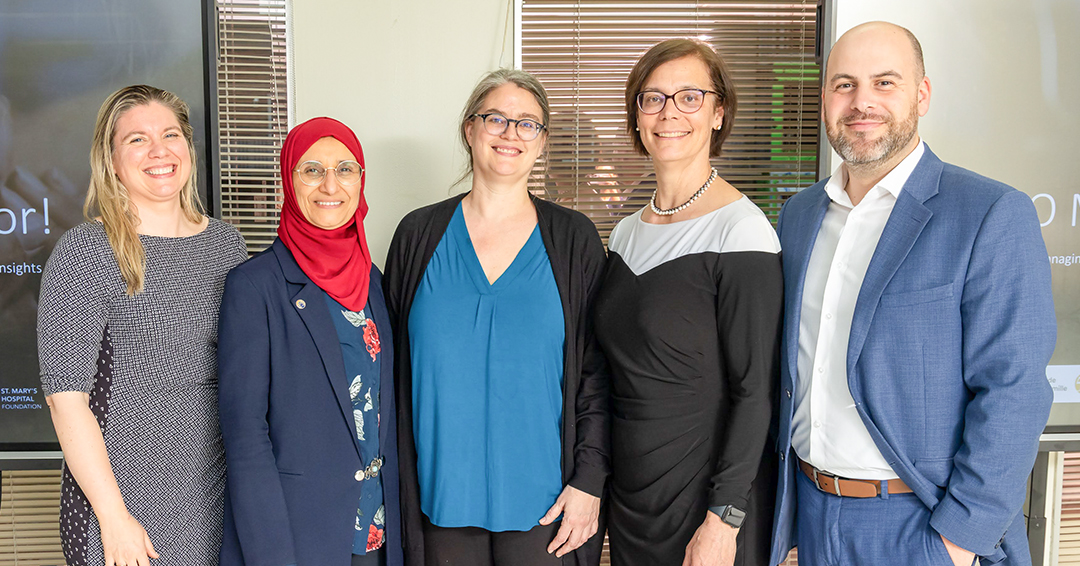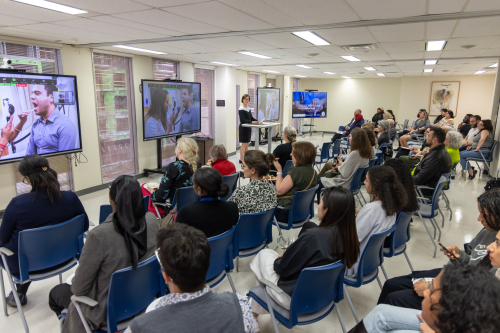
On April 29, the McGill Department of Family Medicine hosted the annual Dr. Hirsh Rosenfeld Distinguished Public Lecture in Family Medicine, spotlighting a critical yet often overlooked facet of clinical care: the cultural interpretation of pain. Titled “Too much pain, doctor!”: Recognizing and Contextualizing Cultural Expressions of Pain, the event featured Isabelle Leblanc, MD, PhD, Assistant Professor in McGill’s Department of Family Medicine and physician at St. Mary’s Family Medicine Centre. The event also marked the Department of Family Medicine’s 50th anniversary, celebrating a half-century of leadership in primary care, research and community engagement.
Held both in person at the Department’s Côte-des-Neiges location and via Zoom, the lecture attracted a diverse audience of clinicians, students, researchers and community members. The event was a collaborative effort between the Department of Family Medicine, the St. Mary’s Research Centre and the St. James Literary Society.

Marion Dove, MD, FCFP, Chair of the Department of Family Medicine, opened the evening with a land acknowledgement and a warm welcome. “Pain is something every family physician encounters daily. It’s complex, it’s deeply personal, and, too often, it is misunderstood or undertreated,” said Dr. Dove. “Addressing this challenge requires the kind of holistic, interdisciplinary approach that Family Medicine champions.”
Najia Hachimi-Idrissi, MD, Associate President and Executive Director of CIUSSS de l’Ouest-de-l’Île-de-Montréal, also delivered insightful opening remarks, emphasizing the growing need for culturally sensitive approaches in healthcare delivery. She underscored the relevance of the evening’s theme to the broader mission of health equity across the CIUSSS network and warmly introduced Dr. Leblanc on behalf of the St. Mary’s Research centre.

Drawing from her interdisciplinary background in anthropology and literature, Dr. Leblanc delved into how psychosocial suffering often manifests as bodily pain, a phenomenon that can be overlooked when cultural expressions are misinterpreted. She emphasized the importance of unraveling patients’ narratives to uncover the underlying causes of their pain, advocating for a more empathetic and culturally sensitive approach to diagnosis and treatment.
“Understanding how expert family physicians recognize and manage psychosocial distress can enhance the detection, diagnosis and treatment of mental health challenges,” said Dr. Leblanc. “The key to contextualizing these expressions lies in unravelling the patient’s narrative and finding shared humanity.”
The lecture underscored the necessity for clinicians to move beyond a purely biomedical model, encouraging the integration of cultural competence into medical practice. By recognizing the various ways patients express suffering — shaped by language, community, and identity — clinicians can respond with greater empathy and precision.

Attendees engaged in a dynamic Q&A session, reflecting the community’s keen interest in enhancing cultural awareness within clinical settings. The event created a space for reflection and dialogue across disciplines, reinforcing the Department’s role in shaping thoughtful, human-centred healthcare.
The Dr. Hirsh Rosenfeld Distinguished Public Lecture in Family Medicine series continues to be a cornerstone of the Department’s commitment to addressing complex issues in Family Medicine through public engagement and scholarly discourse. This year’s focus on cultural expressions of pain aligns with broader efforts to promote equity, diversity and inclusion in healthcare.
For those who missed the live event, a recording is available on the Department’s YouTube channel: Watch the lecture.
Photo Credit: Owen Egan and Joni Dufour.

